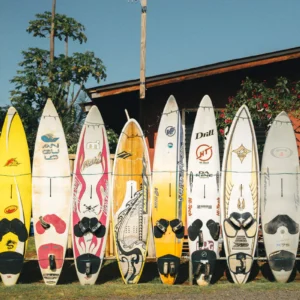Surfboard vs Paddle Board: A Social Exploration

By Andie
Welcome to a world where the ocean isn’t just a body of water but a platform for fun, adventure, and social exploration. In this arena, two players stand out – the surfboard and the paddle board. Today, we delve into an exciting surfboard vs paddle board showdown as we examine not just their physical differences, but their social perceptions and influences too.
The Basic Differences
First off, let’s get the trivialities out of the way. Surfboards come in different shapes and sizes but are smaller than most paddle boards. They are designed for riders to maneuver waves, while paddle boards, also known as Stand Up Paddleboards (SUP), are designed for various activities including surfing, racing & leisure paddling. The major difference is that you stand on a paddle board and use a special kind of paddle to propel yourself through the water.
UL>Introduction to Surfing
The allure of surfing comes primarily from its reputation as an adrenaline-pumping sport. Success in riding a wave is often seen as a hallmark of agility, strength and courage – qualities many would like to be associated with. Consequently, many see surfers as cool thrill-seekers living life on their own terms.
The Perception around Paddling
Paddleboarding markets itself differently. While it can be thrilling depending on how and where it’s pursued, it is often viewed as more relaxed compared to surfing. This perspective has made it popular among more serene crowds who appreciate the calming effect of gliding slowly over water bodies with picturesque landscapes.
The Learning Curve
Getting started with both sports can seem daunting for beginners. With surfing, learners need to balance while moving over a turbulent water surface. Paddleboarding might appear easier because of the stability its larger board offers, but it presents challenges such as steering and efficient paddling.
The Appeal to Different Demographics
While surfing has a significant young demographic, paddle boarding appeals more comprehensively to all age groups. Its broad appeal stems from its versatile nature and variability in intensity. Children can enjoy leisurely paddles with safety gear, while older individuals partake in gentle yoga sessions on paddle boards.
Surfing’s Influence on Popular Culture
From movies like ‘Point Break’ to songs like ‘Surfin’ USA’, surfing’s influence on popular culture is undeniable. It’s often associated with a carefree attitude, adventure, and an uncontained spirit that resonates with many people across the globe.
The Paddle Board Yoga Phenomenon
Paddle board yoga is an exciting new crossover between fitness and outdoor fanatics. Practitioners consider it more challenging and refreshing than standard yoga. This newest trend adds yet another facet to how paddle boards permeate various social niche activities.
Social Interactions and Community
While both sports stimulate social interactions, they do so in their ways. The surfing community fosters camaraderie amongst participants waiting for waves or discussing shared experiences. Paddle boarding also supports community engagement during group outdoor adventures or fitness classes.
Sustainability Considerations
Both surfboards and paddle boards raise sustainability concerns due to their manufacturing methods. However, several companies are shifting towards more eco-friendly material choices and production practices, introducing surfboards made from recycled …read more
Source:: Social Media Explorer







